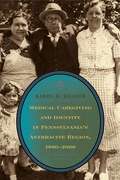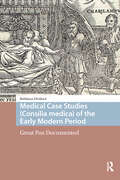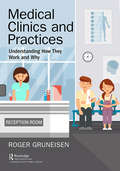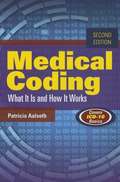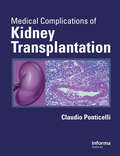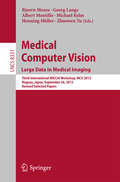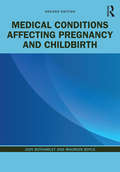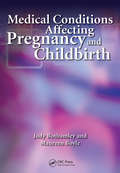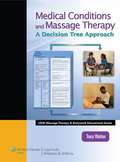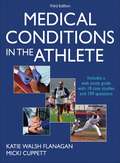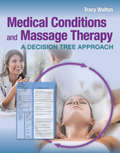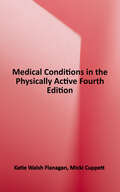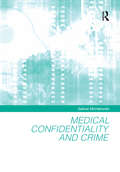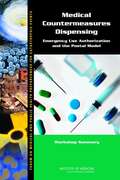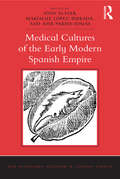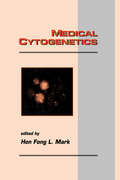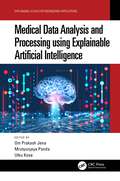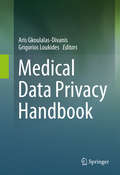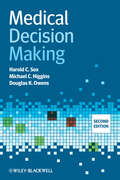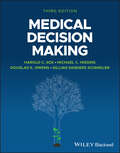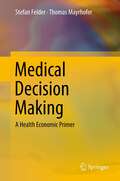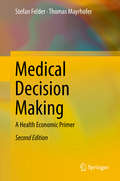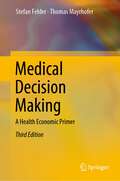- Table View
- List View
Medical Caregiving and Identity in Pennsylvania's Anthracite Region, 1880–2000
by Karol K. WeaverWhile much has been written about immigrant traditions, music, food culture, folklore, and other aspects of ethnic identity, little attention has been given to the study of medical culture, until now. In Medical Caregiving and Identity in Pennsylvania’s Anthracite Region, 1880–2000, Karol Weaver employs an impressive range of primary sources, including folk songs, patent medicine advertisements, oral history interviews, ghost stories, and jokes, to show how the men and women of the anthracite coal region crafted their gender and ethnic identities via the medical decisions they made. Weaver examines communities’ relationships with both biomedically trained physicians and informally trained medical caregivers, and how these relationships reflected a sense of “Americanness.” She uses interviews and oral histories to help tell the story of neighborhood healers, midwives, Pennsylvania German powwowers, medical self-help, and the eventual transition to modern-day medicine. Weaver is able to show not only how each of these methods of healing was shaped by its patrons and their backgrounds but also how it helped mold the identities of the new Americans who sought it out.
Medical Case Studies: Great Pox Documented (Premodern Health, Disease, and Disability)
by Bohdana DivisováConsilia played an important role in not only medieval but also early modern professional health literature. A literary ‘consilium’ consisted of a written statement of one particular case, including the patient's condition and disease as well as advice concerning medical treatment. In the sixteenth century, consilia literature was a common component of the practices of many eminent physicians. This is illustrated through an analysis of consilia from twenty-two different collections and anthologies by fifteen selected authors, who represent university professors, personal physicians, and urban physicians from early modern Italy, France, and German-speaking Central Europe. A closer look at nearly 7,000 consilia shows how important a link they were within the medical community. A detailed view of consilia intended for patients suffering from the ‘French disease’ reveals details about, for instance, the most common treatments for syphilis – mercury and guaiacum – alongside many other interesting and important details.
Medical Clinics and Practices: Understanding How They Work and Why
by Roger GruneisenA hospital can be a private or public sector building where patients are admitted for acute treatment. On the other hand, a clinic is a hub of healthcare activity and a place where care providers interact with patients, prescribe medicine, and provide care instructions on what to do after leaving the clinic. Both sites have different and specific operational management needs and requirements. This book serves as a guide to new consultants, management engineers, administrators, and sales professionals seeking to assess simple clinics or medical practice operations. In addition to providing important information about the various aspects of managing a clinic or medical practice, each chapter explains common operating practices seen today and gives some indication of good or better practices. To organize the chapter flow, the chapters are simplified into the typical flow of how a patient moves through the system from patient access to registration to discharge and is presented in a ‘Fact Finder’ format. In this format, the author answers important questions: What is a care team? What kind of physical space does the practice need? What about equipment and technology needs? Finally, the author concludes with key infrastructure concepts, such as leadership and management systems, integration into larger systems, and key measurements. All topics important to those working in or servicing the ambulatory market.
Medical Coding: What It Is and How It Works (Second Edition)
by Patricia T. AalsethIn clear and straightforward language, Medical Coding: What It Is and How It Works, Second Edition provides an overview of the evolution of medical coding and all the various coding systems, how they relate, and how they function. Reasoning and consequences of the delayed ICD-10 implementation are explained along with a sound overview of the ICD-10-CM and PCS classification systems. For those contemplating a career in the coding field, this book is ideal as a basic orientation. Other individuals in healthcare management and administration will also benefit from a basic understanding of how coding works. Unlike other publications that focus only on coding, this book integrates coding guidelines and principles into the billing and reimbursement process, giving the student a more practical foundation in the rationale for correct coding. Healthcare fraud and abuse is addressed as well, to assure that readers understand ethical concerns inherent in coding for reimbursement. Instructor Resources: Instructor's Manual, PowerPoint slides, Test Bank
Medical Complications of Kidney Transplantation
by Claudio PonticelliWith color illustrations throughout, this book analyzes the implications that transplantation and immunosuppression can hold for patients. Discussing the many complications that may occur after kidney transplantation, this source is a must for anyone caring for patients recovering from this type of procedure.
Medical Computer Vision. Large Data in Medical Imaging
by Henning Müller Georg Langs Bjoern Menze Albert Montillo Michael Kelm Zhuowen TuThis book constitutes the thoroughly refereed post-workshop proceedings of the Third International Workshop on Medical Computer Vision, MCV 2013, held in Nagoya, Japan, in September 2013 in conjunction with the 16th International Conference on Medical Image Computing and Computer-Assisted Intervention, MICCAI 2013. The 7 revised full papers and 12 poster papers presented were selected from 25 submissions. They have been organized in topical sections on registration and visualization, segmentation, detection and localization, and features and retrieval. In addition, the volume contains two invited papers describing segmentation task and data set of the VISCERAL benchmark challenge.
Medical Computer Vision. Large Data in Medical Imaging: Third International MICCAI Workshop, MCV 2013, Nagoya, Japan, September 26, 2013, Revised Selected Papers (Lecture Notes in Computer Science #8331)
by Bjoern Menze, Georg Langs, Albert Montillo, Michael Kelm, Henning Müller and Zhuowen TuThis book constitutes the thoroughly refereed post-workshop proceedings of the Third International Workshop on Medical Computer Vision, MCV 2013, held in Nagoya, Japan, in September 2013 in conjunction with the 16th International Conference on Medical Image Computing and Computer-Assisted Intervention, MICCAI 2013. The 7 revised full papers and 12 poster papers presented were selected from 25 submissions. They have been organized in topical sections on registration and visualization, segmentation, detection and localization, and features and retrieval. In addition, the volume contains two invited papers describing segmentation task and data set of the VISCERAL benchmark challenge.
Medical Conditions Affecting Pregnancy and Childbirth
by Maureen Boyle Judy BothamleyMidwives are encountering more and more women whose pregnancies are complicated by medical conditions, including cardiac disease, obesity and diabetes. This new edition is completely up-to-date and offers highly practical solutions for everyday midwifery practice, acknowledging the importance of promoting normality where possible. This text includes physiology, explanations of conditions and principles of care for preconception, pregnancy, labour, birth and the postnatal period. Each chapter brings together the basic knowledge of a condition and how it changes during pregnancy in an integrated and accessible way, including a new chapter dedicated to obesity. Explanations of laboratory tests, diagnostic tests, common drugs and illustrative colour pictures are included in relevant chapters. Medical Conditions Affecting Pregnancy and Childbirth is a vital guide for student midwives, as well as a useful reference for practising midwives.
Medical Conditions Affecting Pregnancy and Childbirth: A Handbook for Midwives (Radcliffe Ser.)
by Maureen Boyle Judy BothamleyMidwives are encountering more and more women whose pregnancies are complicated by medical conditions. The number of women with cardiac disease becoming pregnant is growing each year, obesity, older age and the complex health problems of women born outside the United Kingdom have also been identified as key factors, and women with serious medical c
Medical Conditions And Massage Therapy: A Decision Tree Approach
by Tracy WaltonPresent this quick, effective method for assessing and managing common medical conditions! The central tool of this text is the decision tree, a simple flowchart that helps students quickly determine the optimal massage therapy approach for specific medical conditions. A Decision Tree is included for each of the more than 50 conditions discussed in the book, with massage considerations listed for numerous additional conditions in brief. Also unique to this text are questions therapists can ask clients during the interview process to help the therapist understand not just the medical condition, but how it presents in a particular client.
Medical Conditions In The Athlete
by Micki Cuppett Katie FlanaganMedical Conditions in the Athlete, Third Edition, equips health care providers with the information they need to develop a framework for decision making when working with injured and recovering athletes and active populations.
Medical Conditions and Massage Therapy
by Tracy WaltonWith this book’s streamlined, innovative approach, you’ll learn how to manage and assess medical information in order to determine massage contraindications.
Medical Conditions in the Physically Active, Fourth Edition
by Micki Cuppett Katie Walsh FlanaganThis book assists athletic trainers and other allied healthcare providers in recognizing and identify medical conditions in athletes and active individuals. The book addresses medical conditions by body system, their mechanism of acquisition, signs, symptoms, differential diagnoses, referral, treatment, return-to-participation criteria, and potential comorbidities. Previously titled Medical Conditions in the Athlete, this fourth edition uses current research to offer assessment and treatment information for medical conditions that affect both athletes and active populations. The highly esteemed authors, Katie Walsh Flanagan and Micki Cuppett have combined their professional skills and educational expertise to create a valuable athletic training resource with updated content that aligns with the Board of Certification (BOC) and Commission on Accreditation of Athletic Training Education (CAATE) standards. The fourth edition offers the following updates: - A new section on acute respiratory illnesses, including COVID-19 and SARS - A new section on gastrointestinal disorders - A new chapter on endocrine disorders - Expanded content on concussion detection, treatment, and management, including return to play guidance - New photos presenting medical conditions on diverse skin colors to help students learn identification skills - Three case studies per chapter, delivered through HKPropel, to provide students with real-world examples; the case studies include multiple-choice questions that are assignable and automatically graded The book is organized into three sections—Introduction to Medical Conditions, Pharmacology and Interventions, and Medical Conditions by System—and there are 18 comprehensive chapters. Throughout the text, more than 350 full-color illustrations and photographs visually enhance readers’ comprehension of anatomy, physiology, and pathophysiology. Pharmacological tables organize drugs by categories that include generic and trade names, therapeutic uses, adult dosage information, and possible adverse effects. Important terminology is highlighted throughout the chapters, and a glossary appears at the end of the text. Chapter objectives and chapter summaries assist students in finding key information. Chapter quizzes, which are automatically graded, may also be assigned to test comprehension of critical concepts. At the beginning of the text, a Condition Finder serves as a quick reference so students or clinicians can easily flip to the information they need on specific conditions. Throughout the book, Red Flags for Urgent Intervention offers warning signs that healthcare providers should look for when working with patients; Clinical Tips discuss information that is critically important to professionals; and Condition Highlights cover specific medical conditions common to athletes and the physically active that require special attention or medical care. Medical Conditions in the Physically Active, Fourth Edition With HKPropel Access, provides comprehensive medical information to help readers build a framework for decision-making that will help them choose effective courses of treatment. Note: A code for accessing HKPropel is included with all new print books.
Medical Confidentiality and Crime
by Sabine MichalowskiMedical confidentiality is universally recognised as a value worth protecting. However, difficulties arise when confidential medical information becomes relevant in the context of crime prevention and criminal prosecution. Should medical confidentiality be upheld where the physician holds information which is essential for the investigation of a serious crime; for establishing the truth in a criminal trial; for an accused’s defence; or for the prevention of a criminal offence? And according to which criteria should such decisions be made? Based on an examination of different approaches in medical ethics and a comparison of the relevant law of France, Germany, England and Wales and the US, this book analyses how a balance of the competing interests can best be struck.
Medical Countermeasures Dispensing: Emergency Use Authorization and the Postal Model - Workshop Summary
by Institute of Medicine of the National AcademiesDuring public health emergencies such as terrorist attacks or influenza outbreaks, the public health system's ability to save lives could depend on dispensing medical countermeasures such as antibiotics, antiviral medications, and vaccines to a large number of people in a short amount of time. The IOM's Forum on Medical and Public Health Preparedness for Catastrophic Events held a workshop on November 18, 2009, to provide an overview of current threats, recent progress made in the public health system for distributing and dispensing countermeasures, and remaining vulnerabilities.
Medical Cultures of the Early Modern Spanish Empire (New Hispanisms: Cultural and Literary Studies)
by John Slater Maríaluz López-Terrada José Pardo-TomásEarly modern Spain was a global empire in which a startling variety of medical cultures came into contact, and occasionally conflict, with one another. Spanish soldiers, ambassadors, missionaries, sailors, and emigrants of all sorts carried with them to the farthest reaches of the monarchy their own ideas about sickness and health. These ideas were, in turn, influenced by local cultures. This volume tells the story of encounters among medical cultures in the early modern Spanish empire. The twelve chapters draw upon a wide variety of sources, ranging from drama, poetry, and sermons to broadsheets, travel accounts, chronicles, and Inquisitorial documents; and it surveys a tremendous regional scope, from Mexico, to the Canary Islands, the Iberian Peninsula, Italy, and Germany. Together, these essays propose a new interpretation of the circulation, reception, appropriation, and elaboration of ideas and practices related to sickness and health, sex, monstrosity, and death, in a historical moment marked by continuous cross-pollination among institutions and populations with a decided stake in the functioning and control of the human body. Ultimately, the volume discloses how medical cultures provided demographic, analytical, and even geographic tools that constituted a particular kind of map of knowledge and practice, upon which were plotted: the local utilities of pharmacological discoveries; cures for social unrest or decline; spaces for political and institutional struggle; and evolving understandings of monstrousness and normativity. Medical Cultures of the Early Modern Spanish Empire puts the history of early modern Spanish medicine on a new footing in the English-speaking world.
Medical Cytogenetics
by Hon Fong MarkThe only monograph on cytogenetics for the pathologist, this up-to-the-minute reference/text contains the most up-to-date research findings on many important topics in medical genetics-notably FISH (fluorescent in situ hybridation)-based molecular cytogenetic technologies and spectral karyotyping. An excellent resource for cytogeneticists prepar
Medical Data Analysis and Processing using Explainable Artificial Intelligence (Explainable AI (XAI) for Engineering Applications)
by Mrutyunjaya Panda Utku Kose Om Prakash JenaThe text presents concepts of explainable artificial intelligence (XAI) in solving real world biomedical and healthcare problems. It will serve as an ideal reference text for graduate students and academic researchers in diverse fields of engineering including electrical, electronics and communication, computer, and biomedical. Presents explainable artificial intelligence (XAI) based machine analytics and deep learning in medical science. Discusses explainable artificial intelligence (XA)I with the Internet of Medical Things (IoMT) for healthcare applications. Covers algorithms, tools, and frameworks for explainable artificial intelligence on medical data. Explores the concepts of natural language processing and explainable artificial intelligence (XAI) on medical data processing. Discusses machine learning and deep learning scalability models in healthcare systems. This text focuses on data driven analysis and processing of advanced methods and techniques with the help of explainable artificial intelligence (XAI) algorithms. It covers machine learning, Internet of Things (IoT), and deep learning algorithms based on XAI techniques for medical data analysis and processing. The text will present different dimensions of XAI based computational intelligence applications. It will serve as an ideal reference text for graduate students and academic researchers in the fields of electrical engineering, electronics and communication engineering, computer engineering, and biomedical engineering.
Medical Data Privacy Handbook
by Aris Gkoulalas-Divanis Grigorios LoukidesThis handbook covers Electronic Medical Record (EMR) systems, which enable the storage, management, and sharing of massive amounts of demographic, diagnosis, medication, and genomic information. It presents privacy-preserving methods for medical data, ranging from laboratory test results to doctors' comments. The reuse of EMR data can greatly benefit medical science and practice, but must be performed in a privacy-preserving way according to data sharing policies and regulations. Written by world-renowned leaders in this field, each chapter offers a survey of a research direction or a solution to problems in established and emerging research areas. The authors explore scenarios and techniques for facilitating the anonymization of different types of medical data, as well as various data mining tasks. Other chapters present methods for emerging data privacy applications and medical text de-identification, including detailed surveys of deployed systems. A part of the book is devoted to legislative and policy issues, reporting on the US and EU privacy legislation and the cost of privacy breaches in the healthcare domain. This reference is intended for professionals, researchers and advanced-level students interested in safeguarding medical data.
Medical Decision Making
by Alan Schwartz George BergusDecision making is a key activity, perhaps the most important activity, in the practice of healthcare. Although physicians acquire a great deal of knowledge and specialised skills during their training and through their practice, it is in the exercise of clinical judgement and its application to individual patients that the outstanding physician is distinguished. This has become even more relevant as patients become increasingly welcomed as partners in a shared decision making process. This book translates the research and theory from the science of decision making into clinically useful tools and principles that can be applied by clinicians in the field. It considers issues of patient goals, uncertainty, judgement, choice, development of new information, and family and social concerns in healthcare. It helps to demystify decision theory by emphasizing concepts and clinical cases over mathematics and computation.
Medical Decision Making
by Harold C. Sox Michael C. Higgins Douglas K. OwensThis book clearly demonstrates how to best make medical decisions while incorporating clinical practice guidelines and decision support systems for electronic medical record systems. New to this edition is how medical decision making ideas are being incorporated into clinical decision support systems in electronic medical records and also how they are being used to shape practice guidelines and policies.
Medical Decision Making
by Harold C. Sox Michael C. Higgins Douglas K. Owens Gillian Sanders SchmidlerMEDICAL DECISION MAKING Detailed resource showing how to best make medical decisions while incorporating clinical practice guidelines and decision support systems Sir William Osler, a legendary physician of an earlier era, once said, “Medicine is a science of uncertainty and an art of probability.” In Osler’s day, and now, decisions about treatment often cannot wait until the diagnosis is certain. Medical Decision Making is about how to make the best possible decision given that uncertainty. The book shows how to tailor decisions under uncertainty to achieve the best outcome based on published evidence, features of a patient’s illness, and the patient’s preferences. Medical Decision Making describes a powerful framework for helping clinicians and their patients reach decisions that lead to outcomes that the patient prefers. That framework contains the key principles of patient-centered decision-making in clinical practice. Since the first edition of Medical Decision Making in 1988, the authors have focused on explaining key concepts and illustrating them with clinical examples. For the Third Edition, every chapter has been revised and updated. Written by four distinguished and highly qualified authors, Medical Decision Making includes information on: How to consider the possible causes of a patient’s illness and decide on the probability of the most important diagnoses. How to measure the accuracy of a diagnostic test. How to help patients express their concerns about the risks that they face and how an illness may affect their lives. How to describe uncertainty about how an illness may change over time. How to construct and analyze decision trees. How to identify the threshold for doing a test or starting treatment How to apply these concepts to the design of practice guidelines and medical policy making. Medical Decision Making is a valuable resource for clinicians, medical trainees, and students of decision analysis who wish to fully understand and apply the principles of decision making to clinical practice.
Medical Decision Making
by Stefan Felder Thomas MayrhoferThis textbook offers a comprehensive theory of medical decision making under uncertainty, combining informative test theory with the expected utility hypothesis. The book shows how the parameters of Bayes' theorem can be combined with a value function of health states to arrive at informed test and treatment decisions. The authors distinguish between risk neutral, risk averse and prudent decision makers and demonstrate the effects of risk preferences on physicians' decisions. They analyze individual tests, multiple tests and endogenous tests where the test result is determined by the decision maker. Finally, the topic is examined in the context of health economics by introducing a trade-off between enjoying health and consuming other goods, so that the extent of treatment and thus the potential improvement in the patient's health become endogenous.
Medical Decision Making
by Stefan Felder Thomas MayrhoferThis textbook offers a comprehensive analysis of medical decision making under uncertainty by combining Test Information Theory with Expected Utility Theory. The book shows how the parameters of Bayes' theorem can be combined with a value function of health states to arrive at informed test and treatment decisions. The authors distinguish between risk-neutral, risk-averse and prudent decision makers and demonstrate the effects of risk preferences on physicians' decisions. They analyze individual tests, multiple tests and endogenous tests where the test outcome is chosen by the decision maker. Moreover, the topic is examined in the context of health economics by introducing a trade-off between enjoying health and consuming other goods, so that the extent of treatment and thus the potential improvement in the patient's health becomes endogenous. Finally, non-expected utility models of choice under risk and uncertainty (i. e. ambiguity) are presented. While these models can explain observed test and treatment decisions, they are not suitable for normative analyses aimed at providing guidance on medical decision making.
Medical Decision Making: A Health Economic Primer
by Stefan Felder Thomas MayrhoferThis textbook offers a comprehensive analysis of medical decision-making under uncertainty by combining test information theory with expected utility theory. The authors show how the parameters of Bayes’ theorem can be combined with a value function of health states in order to arrive at informed test and treatment decisions in the face of diagnostic and therapeutic risks. Distinguishing between risk-neutral, risk-averse, and prudent decision-makers, they demonstrate the effects of risk preferences on medical decisions. Furthermore, they analyze individual and multiple tests as well as diagnostic models in which the decision-maker chooses the test outcome. The consequences of test and treatment decisions for the patient are encompassed by quality-adjusted life years (QALYs) and the standard economic model, which applies the willingness to pay for health approach. Lastly, non-expected utility models of choice under risk and uncertainty are presented. Although these models can explain some of the test and treatment decisions observed, they are less suitable for normative analyses aimed at providing guidance on medical decision-making. This third edition provides extensively revised versions of all chapters and reflects recent innovations in medical decision-making such as decision curve analysis. New chapters focus on the health economics of and revealed preferences in medical decisions. The book is intended for students of (health) economics and medicine as well as for medical decision-makers and physicians dealing with uncertainty in their test and treatment decisions.
